Antwerp (Belgium)
Cruise Port schedule, live map, terminals, news
Region
Baltic - Norwegian Fjords - Russia
Local Time
2024-12-02 14:59
 50°F
50°F 10.1°C

 Gentle breeze
Gentle breeze4.6 m/s
 51 °F / 11 °C
51 °F / 11 °C 45 °F / 7 °C
Port Antwerp cruise ship schedule shows timetable calendars of all arrival and departure dates by month. The port's schedule lists all ships (in links) with cruises going to or leaving from Antwerp, Belgium. To see the full itineraries (ports of call dates and arrival / departure times) and their lowest rates – just follow the corresponding ship-link.
| Day | Ship | Arrival | Departure |
|---|---|---|---|
| 29 December, 2023 Friday | 23:00 | 01 Jan, 03:00 | |
| 29 December, 2023 Friday | 23:00 | 01 Jan, 03:00 | |
| 31 December, 2023 Sunday | 18:00 | 01 Jan, 19:00 | |
| 2 January, 2024 Tuesday | |||
| 2 January, 2024 Tuesday | 12:00 | 23:00 |
Antwerp/Antwerpen is the largest port and biggest city in Belgium, with a population of over 0,52 million (followed by Ghent). The seaport is located on Scheldt River and is one of the world's top-20 biggest cargo ports, ranked 2nd largest in Europe. Other major cruise ports in Belgium are Zeebrugge (117 km / 73 mi from Antwerp), Ostend (123 km / 76 mi from Antwerp) and Brussels (55 km / 34 mi from Antwerp).
Albertkanaal/Albert Canal connects Antwerpen with Liege, and also interconnects the rivers Maas and Scheldt. The 1939-opened Canal has length 130 km (81 mi), standard water depth 3,4 m (11 ft) and bridge clearance 6,7 m (22 ft). To allow cargo shipping traffic, the Canal's bridges were recently heightened to min clearance 9,1 m (30 ft). Albertkanaal has a total of 6 sets of locks (each fitted with a boat lift) to overcome the elevation difference of 56 m (184 ft) between Antwerpen and Liege. The canal locks are in Genk, Diepenbeek, Hasselt, Kwaadmechelen, Olen, and Wijnegem.
Port Antwerp-Bruges
Port Antwerp/Haven van Antwerpen (locode BEANR) became commercially important in the 15th-16th century when Europe's diamond industry expanded. Currently, the seaport is ranked Europe's second-largest cargo port (following only Rotterdam Holland). In 2015, Port Antwerp reported 15,1% increase (2010-2015) in containership volumes (up to 9,37 million TEU-containers) while Port Rotterdam handled 11,577 million. The Belgian seaport currently employs 60,000+ people.
The port is located at the upper end of Scheldt River's estuary, which is navigable by marine vessels with GT tonnage up to 100,000 tons as far as approx 80 km / 50 mi inland. Like Port Hamburg Germany, Antwerp port's inland location provides better access to Central European destinations in comparison to most cargo ports on the North Sea. Port docks are connected to the hinterland by rails, roads and inland waterways (rivers and canals).
In 2012, the port handled a total of 14220 ocean ships (carrying 190,8 million cargo tons, of which 53,6% TEUs) and 57044 freight barges (carrying 123.2 million cargo tons). 2017 was a record year as reefer shipping volumes (refrigerated containers) when the port handled a total of 9,969 million tons of perishable cargo transported via container ships. This was a 7,5% increase over 2016. Container shipping growth (in TEUs) increased by 8,5% - from 704,853 (2016) to 765,105 TEUs (2017).
Deurganck Dock's first container terminal was inaugurated in July 2005. The terminal is located on the river's right bank and doesn't require passing through locks. Its full capacity is up to 9 million TEUs annually. Dock's wharf is made of concrete and has length 5,5 km (3,4 mi). The new Kieldrecht Lock (at the end of Deurganck Dock) allows access to port docks on the river's left bank. The lock was inaugurated in June 2016 and is currently ranked world's largest river lock (building cost EUR 340 million) - followed by Berendrecht Lock. Kieldrecht Lock leads into the Waasland canal, from where marine vessels can access the port's all other docks on Scheldt River's left bank - Doel, Verrebroek, Vrasene, as well as North and South mooring docks.
In October 2010, the port started a EUR 1,6 billion investment plan (2010-2025) to improve all existing facilities, expand storage capacities and improve services. However, Port Antwerpen has little scope for further expansion. Its right bank (northern) docks reached the border with Holland. On the left bank, there is a nuclear power plant. Holland also has territory on the river's south bank, so the port doesn't own Scheldt's outer estuary reaching the North Sea.
In 2016, Port Antwerp received over 600 river cruise ship calls, and 25 calls by ocean-going cruise vessels. The total number of cruise tourists was over 100,000. The visiting ocean vessels are usually small-sized luxury ships and mega-yachts. The list of shipowners (ocean ship operators) includes Oceania, Azamara, Crystal, Lindblad-National Geographic, Plantours. In 2017, CMV Columbus (fka Pacific Pearl) became the port's largest cruise ship ever.
In April 2018, the Brussels Belgium-based energy company Fluxys took over the port's concession for LNG-bunkering service for river barges and smaller ocean-going vessels. Fluxys' permanent LNG bunkering and storage facility (at quay 526-528) was scheduled for opening by 2019's end, to complement the company's existing mobile bunkering service provided by LNG tanker trucks. In January 2020, to Cryostar Sas (French company specializing in technologies for clean power generation and gas applications) and KC LNG (Kosan Crisplant AS, supplier of equipment and services to LNG and LP gas industries) was awarded a contract for building an LNG-bunkering and truck fuelling facility in Port Antwerp's quay 526-528. Cryostar and KC LNG commissioned the LNG-bunkering facility in 2020-Q1. It serves both LNG-powered river vessels and trucks.
In late-September 2018, MOL Chemical Tankers (subsidiary of Mitsui OSK Lines/THE Alliance) partnered with SEA-Invest for building new tank storage (45-hectares cargo terminal serving chemical tankers) at Delwaide Dock. The joint venture terminal project's budget was estimated between EUR 300-400 million. The new tanker terminal covers 45 hectares.
In October 2018, Antwerp Port Authority (management company) started a promo program to expand rail connections between the seaport and hinterland (Hungary and Austria). In 2015 were opened two regular rail connections to Hungary (Budapest) and three to Austria (Vienna). In September 2018 was added a new regularly new scheduled cargo train service (by Hupac Intermodal Ltd) between Antwerpen, Vienna and Budapest. The service offers two roundtrips weekly. Other large intermodal rail services providers on these routes are Rail Cargo Logistics (Austria), Lineas Intermodal (Belgium) and Kombiverkehr (Germany), offering regular connections between Antwerpen and Linz, Vienna, Wels, Budapest.
Railway-transported goods include steel, machinery, railway wagons, wind generators, liquid cargo (chemical and petrochemical products), TEU-containers, auto industry goods. In 2018, Austria's cargo volumes through Antwerp were 3,5 million tons (14% increase over 2017). Around 15% of Austria's seaport traffic is through Antwerp, which ranks the port 4th (after Koper Slovenia, Rotterdam Holland, and Hamburg Germany).
Port Antwerp is also well connected via waterways to large inland terminals like Duisburg, Ludwigshafen, Regensburg, Basel, Linz, Krems, Vienna, Enns.
In FY2018, seaport's growth was 5,1% (over FY2017) and the 6th consecutive record year with total cargo volume 235 million tons, total container shipping volume 130 million tons (5,8% increase) or 11 million TEUs (5,5% increase). Bulk cargoes increased 4,5% (liquid-bulk, 76,5 million tons), 5% (dry-bulk, 12,8 million tons) and 1,8% (break-bulk, 15,6 million tons). In 2018, in the seaport were made investments (over EUR 2 billion) by leading chemical companies, including Borealis AG (Austria), INEOS (UK), Nippon Chemical Industrial (Japan), MOL Chemical, Oiltanking Stolthaven Antwerp NV.
In May 2020 was established a consortium for sustainable production of methanol (for in-port use). The production plant will be constructed at INOVYN (Zandvliet Site) and is scheduled for completion in 2022. The facility has annual capacity 8000 tonnes.
The companies that formed the consortium are Port of Antwerp, ENGIE (France-based electric utility company), Fluxys (Belgium-based natural gas transmission operator), Indaver NV (part of Katoen Natie), INOVYN (UK-based chemical company, part of INEOS AG), Oiltanking (Germany-based, logistics services) and PMV (business financing/investment company of Belgium's Flemish Government).
Methanol is an essential raw material for the chemical industry. Currently, in Port Antwerp methanol is produced from fossil materials. The "eco methanol" will be produced from CCU-captured CO2 (Carbon Capture and Utilisation process) and eco-generated hydrogen. The "eco-hydrogen" will be produced using renewable electricity.
In December 2020, DP World Antwerp ordered 34x Konecranes Gottwald ARMGs (automatic rail-mounted gantry cranes), raising the Antwerp Getaway Container Terminal's fleet to 54x ARMGs total. The order was with planned deliveries in 2022-2026. The new Gottwald cranes are with stacking capacity 1-over-6 TEUs spanning 9 rows.
EDR Antwerp Shipyard is a ship-repair and refurbishment facility (in Port Antwerpen) which until 2021 was operated under the company "Engine Deck Repair NV". Following the acquisition, the facility was significantly upgraded (new technologies and machinery), redeveloped (drydock renovations, quays, tanker ship docks, degassing sites) and expanded (new and renovated logistics warehouses). The machinery improvements included larger cranes (100-tonne) and plasma steel cutters.
In July 2021, Port Antwerp leased under concession ~15 hectares (adjacent to Churchill Dock South) for breakbulk cargoes. The new breakbulk terminal is managed by PSA Breakbulk NV (50-50 joint venture with Felbermayr Holding GmbH /Austrian company specializing in heavy lifting).
In October 2022 started a 9-year infrastructure development project (budgeted EUR 335 million) for renovations and upgrades at Europa Terminal. The project was a partnerships with PSA Antwerp (operator of 3x container terminals + 1x breakbulk terminal) aimed to allow handling larger boxships and bringing additional container capacity. The 3-pahes Europa Terminal's renewal also included dredging along the 1200-m quayside to increase the max draft from 13,5 to 16 m/45-53 ft (to allow safe mooring/berthing during the land works) plus creating temporary moorings for inland navigation. For the marine engineering and construction works were contracted 4 companies - Artes Roegiers, Depret NV (Artes Group), Herbosch-Kiere NV, and Royal Boskalis Westminster NV.
In February 2023, Royal Vopak NV (tank storage company) acquired from Gunvor Group Ltd the subsidiary Gunvor Petroleum Antwerp. The deal gave Vopak access to Gunvor's port area for redeveloping the site. Sized 105 hectares (260 acres) Vopak's new site offers deepwater-river-road-rail access as well as pipeline connections.
Antwerp port statistics 2017
For FY 2017, Port Antwerp reported a record year with a freight shipping volume of 223,607 tons (+4,4% over 2016).
- Container shipping volume increased in tonnage by 4,3% (to 123 million tons) and in TEUs by 4,1% (to 10,450897 million containers),
- Liquid bulk cargo increased by 5,7% (to 73,13 million tons). The growth was driven mainly by crude oil (+49,9% / 5,963279 million tons).
- Dry bulk volume decreased by 3,7% (down to 12,2 million tons). Fertilizers tonnage (largest dry bulk category) increased by 3.7% (to 3,73 tons). The ore volume increased by 12,7%, (2,39 million tons). Coal shipping decreased by 54,2% (477,515 tons).
- Conventional breakbulk reached 10,27 million tons (+4,8%). Iron and steel imports and exports grew by 7,8% (to 8,35 million tons). Imports of raw iron and steel from India increased by 91% (to 520,209 tons), while the imports from China decreased by 44% (to 657,308 tons).
- Ro-Ro shipping traffic increased by 10,5% (to 5,05 million tons). The number of shipped cars increased by 4% (to 1,238128 million units.
- Shipping trade volume with the USA grew by 9,7% (overall), with containerized imports increased by 10,4%. The port's European trade volume decreased by 3,6%.
- In 2017, the port handled a total of 14,223 seagoing vessels (1,7% decrease over 2016). However, these ships' overall GT tonnage increased by 1,4%, (to 406,76 million tons).
Antwerp port statistics 2018
In January-June 2018, the port handled 118,648,143 cargo tons (6,5% increase over Jan-Jun 2017).
- The main driver was again containerized cargo - 66,298043 million TEUs (8,2% increase).
- Strong growth was in consumer goods, vehicles (5,2% in Ro-Ro traffic), chemicals (8,2%), breakbulk (6,5% to over 5 million tons), liquid bulk (6,1%, to 38,296955 million tons), iron (8,5%) and steel (7,2%) imports, dry bulk (3,1%, including fertilisers 14,4% and sand-gravel 57%).
- European trade grew 14,2% (transhipment freight). North American trade increased by 10,3%. Asian trade grew by 3%.
- During 2018's first half the port handled 7210 seagoing vessels (1% increase), with total GT tonnage 207,963909 million tons (1% increase).
Among Antwerpen's outstanding features is its system of boulevards (formerly walls encircling the city). The Gothic cathedral Notre Dame (15th century) is the country's largest church and has paintings of Rubens. Other popular tourist landmarks are St Paul church (16th century), Town Hall (16th century), numerous medieval guild houses (guildhalls), botanical gardens, zoo, KMSKA (fine arts museum).
After 1576, the city quickly declined as a result of religious troubles and under provisions of Peace of Westphalia (1648 treaty which closed the navigation on Schelde River until 1795). Modern city's development started in 1863 when the Belgians performed their navigation rights by making a cash payment to Holland. During both world wars (1914-1918, and 1939-1945) Antwerp was occupied by the Germans. In September 1944, the city was heavily bombed by the British during the Battle of the Scheldt.
Antwerp cruise terminal
Larger ships in Antwerp dock at the new cruise terminal Wandelteras Zuid, located near the Het Steen fortress. From here it is 5-min walking distance to the city centre.
Smaller ships dock at the piers Willemdok or Kattendijkook, which are at approx 15-min walking distance from downtown.
Port Antwerp plans to build a new cruise ship terminal, with scheduled completion in 2020. The new passenger terminal is in downtown, located at approx 2 min walking distance from the city's main tourist attractions.
- Cruise Industry
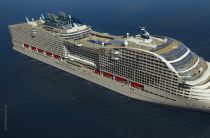
MSC and Explora Journeys implement smart container technology for fresh produce delivery
MSC Cruises and Explora Journeys have partnered with MSC Shipping, the global leader in container shipping, to implement smart container technology...
August 19, 2024 - Cruise Industry

Scenic Cruises unveils 2025 Europe River Cruising and Land Journeys brochure
Scenic Luxury Cruises & Tours has revealed the release of its 2025 Europe River Cruising and Land Journeys brochure, presenting an array of 23...
April 2, 2024 - Cruise Industry
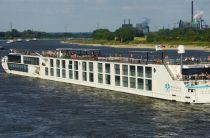
Alle Pierce christens Riverside Debussy, marking inaugural voyage
Renowned TV Host, Producer, and Travel Expert, Alle Pierce, officiated the christening ceremony of Riverside Debussy on Wednesday (March 13) in...
March 16, 2024 - Cruise Industry
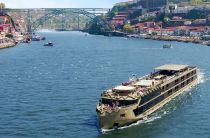
Adventures by Disney expands family travel with Holland and Belgium river cruises
Adventures by Disney continues its dedication to family-oriented travel with the introduction of two new voyages to Holland and Belgium. Commencing...
February 9, 2024 - Cruise Industry
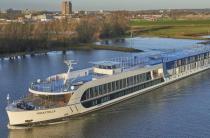
Adventures by Disney unveils new river cruises in Holland and Belgium for 2025
Adventures by Disney is launching two new river cruise routes in Holland and Belgium in April 2025. One itinerary focuses on traditional sights like...
January 14, 2024 - Cruise Industry
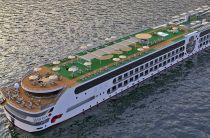
A-ROSA Cruises opens bookings for ALEA and CLEA ships (2024)
Bookings are now open for A-ROSA Cruises' newest fleetmembers A-ROSA ALEA and A-ROSA CLEA - two chartered riverboats scheduled to commence operations...
October 12, 2023 - Cruise Industry
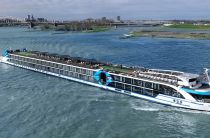
VIVA Cruises' 2024 program features 3rd newbuild riverboat Viva Enjoy
VIVA Cruises/fleet, a specialist in European river cruises, has unveiled its 2024 brochure featuring an impressive selection of 280+ voyages along...
August 11, 2023 - Cruise Industry

A-ROSA SENA departs from Cologne (Koln, Germany) on maiden voyage
On June 18, 2022, the A-ROSA SENA departed from Cologne/Koln (Germany) for her maiden voyage with her first passengers onboard. Prior to this, the...
June 24, 2022 - Cruise Industry
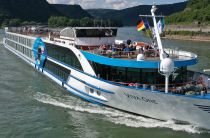
VIVA Cruises' first new build ship VIVA ONE begins Rhine and Moselle sailings
After her May christening, VIVA Cruises’ first newbuild riverboat - MS VIVA ONE, started itineraries on the Moselle and Rhine rivers. To...
May 8, 2022 - Cruise Industry
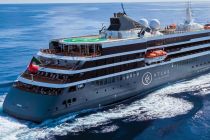
Atlas Ocean Voyages launches 3 new Western European cruises aboard World Navigator
AOV-Atlas Ocean Voyages (subsidiary and travel brand owned by Mystic Cruises USA) announced 3 new Western European cruises aboard World Navigator...
April 11, 2022 - show more news
